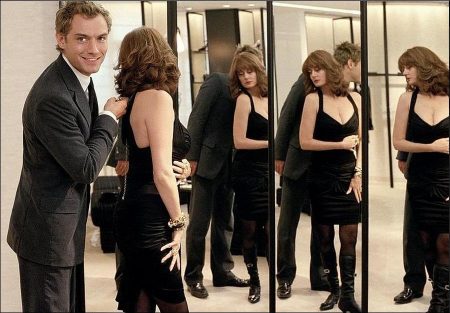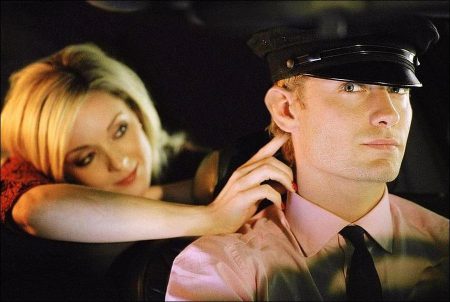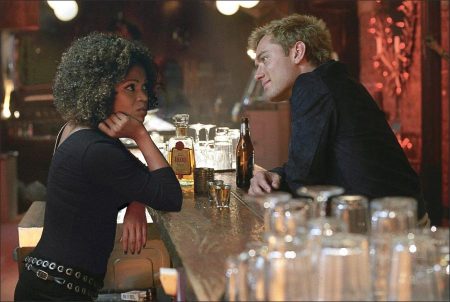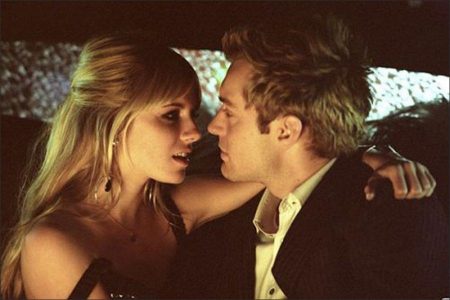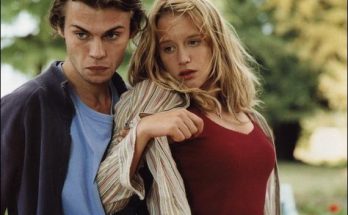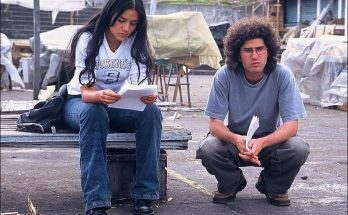Alfie Elkins (Jude Law) works as a limousine driver, chauffeuring the wealthy through the streets of Manhattan, and occasionally making love to his lonely female clients in the backseat. Though he has his ambitions, he wants only enough to get by, his primary focus being the pleasures of life — without any of the responsibilities.
For Jude Law, arguably one of the hottest actors of his generation, portraying Alfie presented a unique challenge. Not only was the actor in every scene, often having an intimate dialogue with the audience, but also he was playing the role of a man with highly questionable integrity.
“This kind of lothario, matinee idol, good-with-the-girls type of character is definitely a test for any actor to portray, but the script was so good I had to do it,” says Law. “Actually, Alfie is more multifaceted than one would think. He’s really quite a thoughtful fellow when you think about it, and he is trying to change his wayward ways.”
Director Charles Shyer and co-writer/producer Elaine Pope decided to tell the character’s story in Alfie’s own words. To do this, the writers employed the challenging technique used in the ’60s classic – where Alfie speaks directly to us, the audience.
“I was very clear that the character should be outrageous, not just in the sense of his actions, but in his thoughts as well,” says Shyer. “By having Alfie speak to the audience, he’s able to offer insight into what he’s really thinking… this is the first of many steps he will take on his bumpy journey to discover what’s truly in his heart.”
Producer / Co-writer Pope felt that the device of having Alfie speak his mind to camera presented a unique opportunity, “Alfie is such an interesting character, damaged and self-destructive, but very up-front,” says Pope. “Whether the audience agrees with his philosophies or not, they become his exclusive confidant. This gave us the chance to address certain, usually unspoken, truths about relationships that everyone can relate to.”
Law observes that breaking that wall between fantasy and reality is something that doesn’t come naturally to an actor. “It was very alien at first, but after a while I began to feel like the wall wasn’t there at all,” says Law. “It truly became second nature for me, and I think that once people watching the movie get used to it, they’ll feel that Alfie is talking to each one of them as a friend.”
Seeing the film as the evolution of a man who goes from living a mindless existence to one who is trying to become mindful, director Charles Shyer walked a careful line between comedy and drama. In fact, both he and actor Jude Law skillfully balanced Alfie’s dark side with his fun-loving outlook on life.
“Charles is a director who understands comedy very well,” says Law. “I was always trying to pull out the darkness from Alfie, and thankfully, Charles was there to help pull out the light. It was the perfect blend.”
Shyer welcomed Law’s take on the more serious side of the character, but encouraged him to offset it by exploring the subtle humor. “There’s a definite dark side to Alfie,” says the director. “The dark side being his blindness, his ignorance and his cruelty, all of which he’s blissfully unaware of — until, of course, he’s forced to take a hard look at himself and the pain he’s wrought.”
Alfie’s Flock of “Birds”
With Jude Law onboard as Alfie, the project began to attract actresses as versatile and talented as Academy Awardâ winners Marisa Tomei (“My Cousin Vinny,” “In the Bedroom”) and Susan Sarandon (“Dead Man Walking,” “Bull Durham”), as well as Nia Long (“Boyz N the Hood,” “Third Watch”) and Tony Award winner and Golden Globe nominee Jane Krakowski (“Nine,” “Ally McBeal”). Add one of England’s hottest young actresses, Sienna Miller, and the lineup of world-class leading ladies is complete. As diverse as the actresses who portray them, the women in Alfie’s life are best described by the character himself :
JULIE (Marisa Tomei) is a single mother, whom Alfie visits when he needs a bit of comfort and home cooking. As Alfie says, She’s my semi-permanent-quasi-sort-of-girlfriend. According to Tomei, Julie is a survivor. She loves Alfie, but she’s starting to not like him very much. “I just love portraying this kind of character who grows stronger right before our eyes,” says Tomei. “I think a lot of women will relate to Julie. She’s looking for a guy who can commit, but she kind of likes the roguish boyish charm…until it starts to get old.”
LIZ (Susan Sarandon) is as sexy as she is successful, and one of the women in Alfie’s life who just might just be able to keep up with him in both the libido and the charm department. As Alfie declares: She’s someone who could mother you and rock your world. Fifty if she’s a day – beautifully preserved and cleavage like the Holland Tunnel.
“I love the way my character is described in the script: `A voluptuous (some would say over-ripe, all would say sexy) woman decked out in Chanel.’ I mean, who wouldn’t want to play a vixen like that!” laughs Sarandon. “Actually, beyond the physical description, I like how tough this broad is. She finally dishes out to Alfie what he’s been dishing out to women for years.”
LONETTE (Nia Long) is one woman in Alfie’s life whom he has always considered out of his league. She’s also off-limits since his best friend, Marlon, portrayed by Omar Epps, wants to marry her. Still, Alfie can’t help notice how Lonette is …gorgeous, smart, funny, can balance a dozen drinks on a tray and still move like poetry.
“No one sees through Alfie more than Lonette does, yet even she succumbs to his charms,” observes Long. “I was very excited to read her storyline in the script because it follows a very different curve than the other women. In fact, I think what happens between her and Alfie really opens his eyes a little… actually a lot.”
DORIE (Jane Krakowski) is a frustrated housewife who’s content with her “weekly Alfie fix.” According to Dorie, her old man hasn’t touched her in six months, which in Alfie’s mind is an invitation to help the guy out by picking up the slack for him. To Dorie’s face, Alfie says, “You deserve to be appreciated.” To the camera, he adds a caveat: While she’s in her prime.
“What’s interesting about Alfie is he’s completely honest and up-front on one level, but oblivious to how he hurts people on another,” observes Krakowski. “In Dorie’s case, she always has her eyes wide open …except for maybe a moment or two when she fantasizes that her relationship with Alfie is more than it is. But doesn’t everybody do that during a relationship at one time or another?”
NIKKI (Sienna Miller) happens into Alfie’s life when he’s at a bit of a low point, driving around the city, alone in his limo on Christmas Eve. Perhaps that’s why he describes Nikki as his “Christmas Miracle.” It is only after they’ve been involved for a while that Nikki’s flaws rise above her gorgeous packaging, at which point Alfie is reminded of a Greek goddess he once saw chiseled in marble: That’s Nikki, a beautiful statue, damaged in a way you can’t see till you get too close.
“My character is the poster child for codependents,” laughs Miller, who credits her appearance in “Alfie” as her first starring role. “Jude and I have some pretty steamy scenes, which were a lot of fun – and I don’t mean just because he’s gorgeous, but because he made me feel comfortable throughout every take. This was a wonderful experience all-around.”
MARLON (Omar Epps) Not one of Alfie’s “birds” but certainly among the people who flock around him, Marlon is Alfie’s best mate and future business partner. The polar opposite to Alfie, whom he calls “Iceman,” Marlon can’t understand his friend’s coldhearted approach to relationships any more than Alfie can understand Marlon’s warmhearted one. Witness Alfie’s advice after Lonette breaks up with Marlon: Pretend she got run over by a truck and died. Funeral was this afternoon. You’re all cried out. Single and ready to move on.
“Marlon’s a decent guy suffering from what a lot of men and women experience in the dating world – the is-there-someone-else-better-out-there syndrome,” observes Epps. “But when he realizes what he has in Lonette, he’s willing to own up to it and take the plunge. A lot of guys see a fellow like Alfie as lucky, but this film paints an honest picture of how lonely his world really is.”
What Is It About Alfie?
While working on the film, Jude Law began to reflect on just what it is that makes a guy like Alfie so attractive to women. A huge fan of the original film and of Michael Caine’s take on the character, Law says the modern-day Alfie he has created is on an entirely different journey than the swinging playboy Caine portrayed in 1966.
“There’s no doubt that individuals with Alfie’s attitude existed back then and there’s no doubt they exist today,” observes Law. “Some would even say that his attitude is actually more relevant to the way people currently think; that is, more freely with regard to sex and dating.”
Law also points out that when the original film came out it was shocking to think that some men actually behaved that way. “It’s almost 40 years later, though, and of course, women have changed. What they’ll put up with today and what they’ve learned since the ’60s changes the entire tone of a film like this.”
Still, the question remains: Why, throughout the centuries, have intelligent women been drawn to men like Alfie? With their reckless approach to partnership, their disdain of commitment and their disregard of everyone’s feelings but their own, the Alfies of the world continue to get away with their bad-boy attitudes and win the hearts of women from all walks of life.
“That’s why this story is so universal and so classic,” observes director Charles Shyer. “It’s a cautionary tale, one that says wake up and see how your behavior affects others. Our modern Alfie experiences a true journey, from someone who is blind to his actions, to someone who begins to have a bit of insight into the error of his ways. It slowly dawns on Alfie that perhaps the person who is suffering the most is himself.”
Location and Decor
Using key elements of New York City and detailed set design to create an updated film for today’s generation, director/co-writer/producer Charles Shyer and co-writer/producer Elaine Pope set their modern “Alfie” entirely in Manhattan. Pope explains: “One of the ways to bring the film to a whole new audience is to bring Alfie to New York, making him a fish out of water. To quote Sting, he’s `an Englishman in New York.’ He’s living his dream, but under it all he’s a little lost in the big city. With very few friends and no family, he is without any deep emotional anchor.”
Exteriors in Manhattan and its surrounding boroughs serve as the backdrop for Alfie’s exploits. Prominent New York landmarks, such as Tavern on the Green aglow with Christmas lights, The Waldorf Astoria Hotel on Park Avenue, the Chanel boutique on Madison Avenue, as well as a variety of locations in SoHo, Greenwich Village and the spectacular vista of Manhattan’s skyline from Brooklyn’s DUMBO section, all serve as Alfie’s playground…and eventually his school of hard knocks.
While the exteriors of the film build excitement into Alfie’s lifestyle, it is the interior sets and the costume designs that truly define his character and that of all the women he woos. Creating all the sets, from Alfie’s own humble digs in the low-rent end of Manhattan’s Lower East Side to Liz’s ultra-posh penthouse on the Upper East Side, is set designer Sophie Becher (BAFTA nominee for “The Borrowers”).
“Since Alfie is a transplanted Englishman in New York, Jude Law had very specific elements he felt should be added to Alfie’s environment,” Becher recalls. “For example, he thought that Alfie would probably have brought some items with him from England, specifically, English comic books: Dandy, which is still published today, and Roy of the Rovers, which was big in the ’60s and ’70s. He also suggested that Alfie own a copy of David Niven’s memoir, The Moon’s a Balloon, and he contributed his own orange-colored 1960s record player.”
In addition to researching single-male apartments in New York, which gave Becher the idea for the tin ceiling and the Mansard windows that poke out of the roofline, the designer also wanted to show Aflie’s transient lifestyle through his belongings. “Actually, Alfie doesn’t have many trappings,” says Becher. “In fact, he rarely spends the night in his own apartment, so it’s not surprising to see towels from various upscale hotels, such as the Soho Grand, as part of his accoutrements.”
While Alfie’s transplanted lifestyle is evident in what he’s brought over from England, Liz’s elegant surroundings are indicative of her established and worldly accomplishments. Alfie’s uptown mistress’ apartment is clearly upscale, replete with an exquisite Swarovski crystal chandelier created by Swedish designer Tjord Bjornson; contemporary fabrics by textile designer Neisha Crosland; and eclectic artwork, including a portrait of Liz (Susan Sarandon) 20 years younger by Russell Oxley.
“Liz’s penthouse is the height of decadence – extremely sensual and very luxurious,” says Becher. “The goal was to create a place that would bowl over a guy like Alfie, someone who doesn’t impress easily. In fact, we wanted Liz’s set to be aspirational for Alfie, so that when he reacts with the attitude that he needs to `aim higher,’ the audience can relate.”
The owner of her own cosmetic company, Liz is a well-traveled, self-sufficient woman with her own acquired style. According to Becher, Charles Shyer first based his ideas on Liz’s surroundings on Goldie Hawn’s apartment in New York.
“The golden statute of Buddha prominently displayed in the living area is indicative of Liz’s eclectic spiritual background and her worldliness,” Becher points out. “Her taste is also reflected in the exquisite floral arrangements, particularly the green orchids tied to Japanese twisted bamboo. Even the absinthe glassware that Liz uses during one of her most sensual experiences with Alfie is a beautiful antique. In fact, it was very important to Charles that Liz’s character truly live up to her expensive tastes, so he even had an absinthe expert on the set for a couple of days to advise the actors on the ritual of drinking the taboo liquor.”
From the thin crème-colored granite panels, accented with black veins that were backlit behind the bar, and the 14-by-10-foot Plexiglas fireplace made to look like mother-of-pearl, to the 8-by-4-foot, crème-colored limestone bathtub, Liz is definitely living large. On the other end of the spectrum is single-mother Julie (Marisa Tomei), who lives somewhere between Alfie’s sparse lifestyle and Liz’s grand one..
“Marisa wanted her character’s environment to be an expression of her independence, so we decorated it with a tasteful combination of thrift-store items, gifts from friends and things she’s crafted herself,” Becher recalls. “Her place isn’t just a white box. It’s a vivid mix of plum and olive green, and it’s indicative of the mood in the beginning of the film, which starts out bright and vibrant in the Soho area, and ends up quite subdued, like Alfie himself.”
Alfie (2004)
Directed by: Charles Shyer
Starring: Jude Law, Sienna Miller, Susan Sarandon, Marisa Tomei, Omar Epps, Renée Taylor, Jane Krakowski, Nia Long, Tara Summers, Jefferson Mays, Dick Latessa
Screenplay by: Elaine Pope, Charles Shyer
Production Design by: Sophie Becher
Cinematography by: Ashley Rowe
Film Editing by: Padraic McKinley
Costume Design by: Beatrix Aruna Pasztor
Set Decoration by: Penny Crawford
Art Direction by: Ricky Eyres, Joanna Foley, Alan Gilmore, Marc Homes
Music by: Mick Jagger, John Powell, David A. Stewart
MPAA Rating: R for sexual content, language and drug use.
Distributed by: Paramount Pictures
Release Date: November 5, 2004
Views: 210
